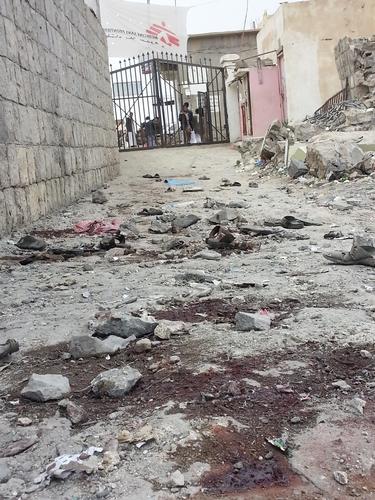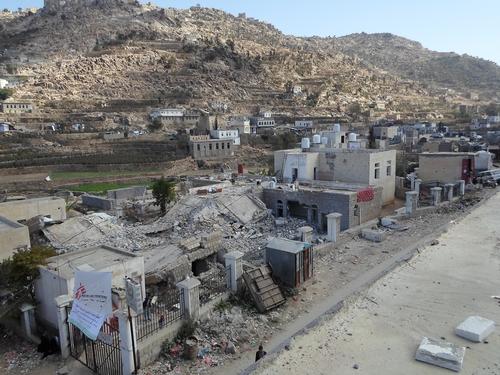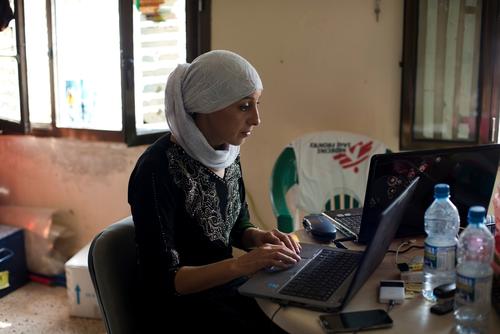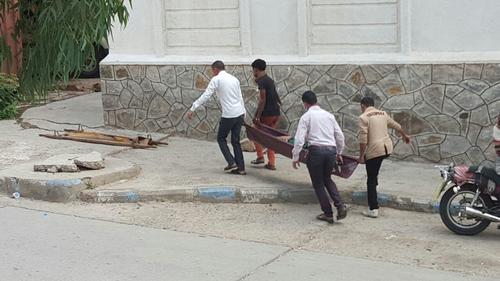Interview with Juan Prieto, general coordinator of MSF projects in Yemen
Shiara hospital is the latest of more than one hundred health facilities affected by the conflict ravaging Yemen.
A week after a projectile hit the Shiara hospital in Razeh district in the north of Yemen, killing six and injuring seven, Juan Prieto, general coordinator of MSF projects in Yemen, talks about the situation in the district and in the country. The MSF supported Shiara hospital is the latest of more than one hundred health centres and hospitals affected by bombings and airstrikes in the international conflict ravaging the country, now in its tenth month.
What is the situation of the people injured by the blast?
Of the eight wounded initially, we transferred five who were in a more critical condition to the MSF-supported hospital in Saada city. One of them has since been transferred to Sana’a for further specialised treatment. Unfortunately, another victim passed away yesterday in Saada. We hope the rest of the patients will recover soon. Organising appropriate care for the victims was our first priority after the hospital was hit.
Do we have any news on the incident?
We are currently trying to get a better picture of what happened. We know that a projectile hit the entrance of the hospital, which had already been destroyed by a previous attack against the centre. The impact sent a lot of shrapnel flying which killed or seriously injured people in the area.
What is the current situation at the hospital?
People still consider hospitals a target and try to avoid them as much as possible. The only cases that we are receiving are emergencies and mass casualties following attacks.
Up to now we have been able to restore the emergency room, stabilisation and referral services, and we are struggling to get the maternity unit back to work. We are working with a reduced staff in the hospital, focusing only on urgent medical needs. The facility is considered a dangerous place, don’t forget that it has been hit three times in the last year.
Nevertheless, our staff have returned to their positions albeit apprehensively. They are more determined than ever, given the situation in the country and the specific needs in Razeh, to continue working for the population.
Shiara is the latest one, but many other medical facilities have been affected directly or indirectly by the conflict. What are the consequences?

We have identified at least 130 facilities directly affected by the conflict, hit by missiles launched from the ground or by airstrikes. We see the consequences now in Razeh, where services have been disrupted or hospitals are in a state of disarray or have been forced to close down, unable to serve the people in need of them.
Medical facilities that should be places of healing for the population, no longer seem to be safe for the patients or for the medical staff operating in them, even when their work and their buildings should be protected. As I say, it is not easy for the medical staff to go back to work when they feel uneasy and threatened. It's a disaster.
What was the reaction of the team in Shiara?
The blast did not affect a functioning area of the hospital. Obviously, after the explosion, the main concern of the team was to organise triage and referral for people in critical condition while attending to the wounded. The patients at the hospital left the building, of course, but medical staff went back to work as soon as they realised that it was over, that there were no more explosions nearby. Patients also started returning to the centre just hours after the incident. Those that were not in critical condition were sent to other areas and those needing stabilisation were prepared and sent to Sadaa hospital.
We need to take into account that our medical staff have been working for seven months under constant bombing in Saada. And in Razeh district, which is on the frontline, the shelling has been continuous since March. Even knowing the risks, we balanced the urgent needs and ensured critical services were provided. Now, after Shiara, the feeling is different, it will take time to restore the trust, to dispel the idea that we are in danger for doing our jobs.
What are the main needs for the population in the area?
First and foremost, protection. People are living in caves, returning to their homes to check on them, to see if they are still standing! They are living under the constant threat of being killed, as this is a conflict area. It's a mountainous region, with about 120,000 inhabitants, who haven't left the area. It's rich in resources, so the basic needs are more or less covered, unlike in other parts of Yemen where people are struggling to access food and water and have nothing to feed their children. The threat is not starvation; here the threat is the war itself.
What are the plans for the hospital now?
Restore normality. We'd like to reinforce the team, improve the quality of services, increase medical supervision, and ensure proximity to our patients and to the people in the area. Meanwhile, we are also trying to clarify the circumstances of this attack so as to establish responsibility if necessary and ensure the safety of our staff.







